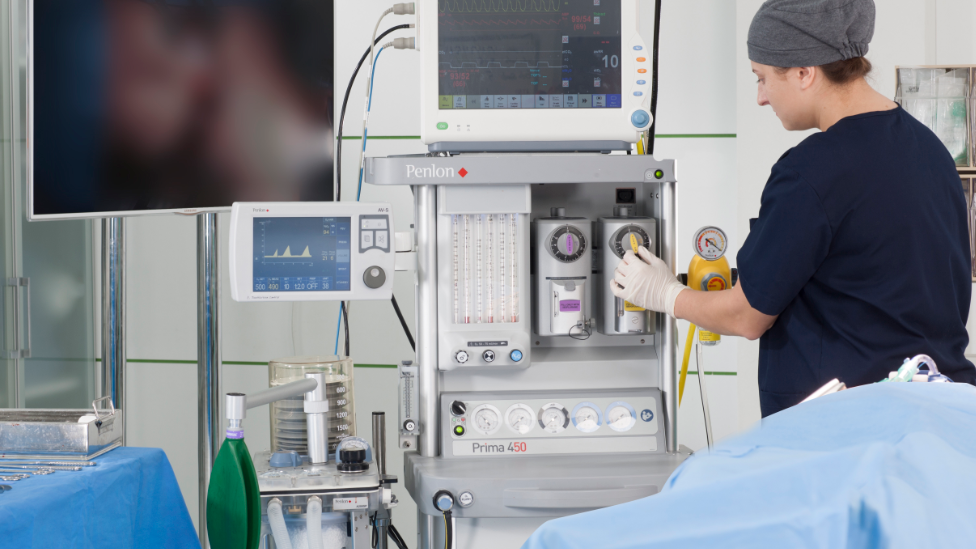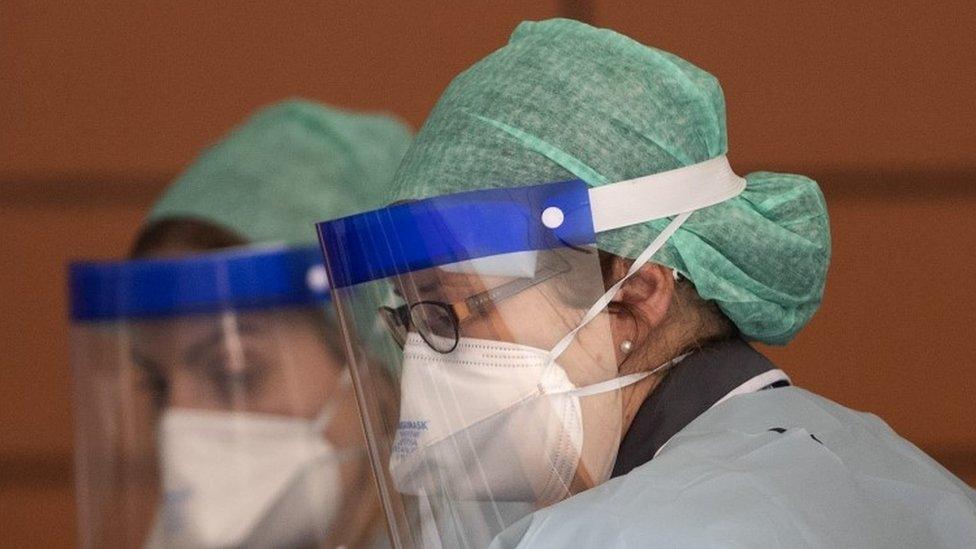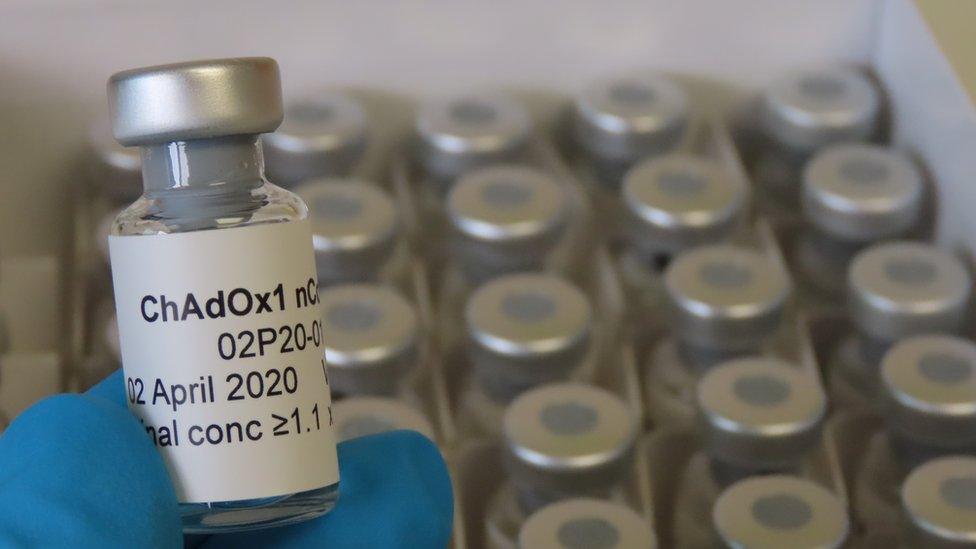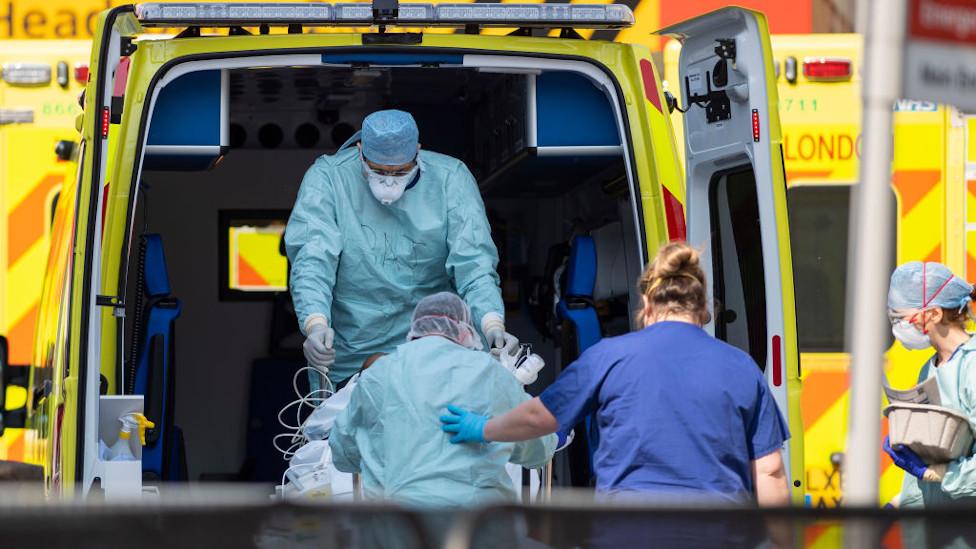Coronavirus: Government facing fresh questions over EU equipment scheme
- Published

The government is facing fresh questions over a row concerning an EU scheme to source medical equipment to tackle the coronavirus outbreak.
Officials have insisted the UK did not receive an initial invitation in time because of communication problems.
But Brussels sources have told the BBC the UK was given ample opportunity to take part in the scheme.
On Tuesday, a senior civil servant retracted claims the UK had taken a "political decision" not to join.
Downing Street has said the government would "consider" joining any future EU schemes to procure Personal Protection Equipment (PPE).
The prime minister's official spokesman also said that the UK will participate in a joint EU scheme to procure therapeutic treatments that is "soon to launch".
A European Commission official told the BBC it is consulting on whether to launch a joint procurement for therapeutic equipment but no decision has been taken about whether to proceed with it.
UK arrangements
Last month the government was criticised for not taking part in the EU plan to bulk buy medical equipment - including potentially life-saving ventilators, protective equipment and testing kit - that could be used to tackle the coronavirus.
At the time, Downing Street said the UK was making its own arrangements because it was no longer in the EU, although ministers denied claims that anti-EU sentiment had played a part in the decision.
Opposition parties accused the government of putting Brexit before public health.
Downing Street later issued a statement saying the UK had been invited to take part but officials did not see the email because of a "communication confusion".
Sir Simon McDonald spoke to the Commons Foreign Affairs Committee by video link
Asked on Tuesday why the decision was taken not to join the scheme, Sir Simon McDonald - who is permanent secretary at the Foreign Office - told the Foreign Affairs Committee that it was a deliberate move by ministers.
"We left the European Union on 31 January," he said.
Pushed further, he added: "All I can say is that it is a matter of fact that we have not taken part. It was a political decision... and the decision is no."
But five hours later, Sir Simon retracted his comments after Mr Hancock disputed the suggestion.
"Due to a misunderstanding, I inadvertently and wrongly told the committee that ministers were briefed on the joint EU procurement scheme and took a political decision not to take part in it," he wrote.
"That is incorrect. Ministers were not briefed by our mission in Brussels about the scheme and a political decision was not taken on whether or not to participate."
He added that "the facts of the situation are as previously set out" and the UK missed the opportunity to take part "owing to an initial communication problem".
However, sources present during Cobra meetings have told the BBC there were discussions about whether to work with the EU at the start of the pandemic.
One minister present said that while there was no decision made during the conversations, it was clear there was an "added dilemma" because of the unfolding politics of the UK's departure from the bloc.
Sources close to Health Secretary Matt Hancock strongly dispute there was any discussion about specific EU schemes.
Speaking at Downing Street's daily Covid-19 press briefing on Tuesday, Mr Hancock said he had now signed-off on joining the EU scheme on an "associate" basis, but "the impact on our ability to deliver PPE is zero" .
"There is no impact at all because the scheme has not yet made anything available," he added.
A European Commission official told the BBC that the UK had not joined any of the four EU procurement schemes on an "associate" basis, "as the deadlines have well passed now and indeed the process is well under way".
Meanwhile, an RAF plane sent to Turkey to pick up a shipment of personal protective equipment (PPE) has arrived back at RAF Brize Norton in Oxfordshire, though it is not yet known exactly what supplies it contained.
The plane was originally expected to arrive in the UK on Sunday, reportedly bringing back 400,000 surgical gowns.
And the UK now has 10,000 ventilators - 3,000 of which are not being used. From early May, 1,500 a week should be supplied by ventilator consortium.

The EU's Joint Procurement Agreement has four schemes.
The first two are for personal protective equipment, including face masks, gloves, and liquid resistant clothing. The third is for ventilators, and the fourth is for laboratory equipment, mainly testing kits.
The EU Commission has confirmed that the UK is not involved in any of them, and has not officially requested to be involved in any of them, despite being "repeatedly invited" by the EU to do so.
The first meeting to establish this joint procurement plan took place at the end of January, two days before the UK left the EU and entered the transition phase. Several other EU meetings on procurement took place, to which a UK representative was "not always there" according to EU officials.
On the 17 March, the procurement procedure was launched, and member states started a public tendering process for suppliers.
This scheme was international, so suppliers worldwide could take part. The selection process took five days, and the EU commission took five days to co-ordinate, having allowed the fast-tracking of procedures.
The EU Commission says they are now waiting for member states to put in their orders for the PPE and medical equipment they need. The first allocations will be in the "coming days and weeks".
The EU hasn't put a figure on the total bulk of purchases they've made yet, because "some countries are still finding more suppliers", but it's understood to be worth hundreds of millions of euros.
The EU says the UK can be part of a "procurement programme in future", as there are ongoing discussions about what else might be needed. There's now nothing formal for the UK to sign up to, at the moment.
The boat has been missed on the current programme.
- Published21 April 2020

- Published21 April 2020

- Published21 April 2020
